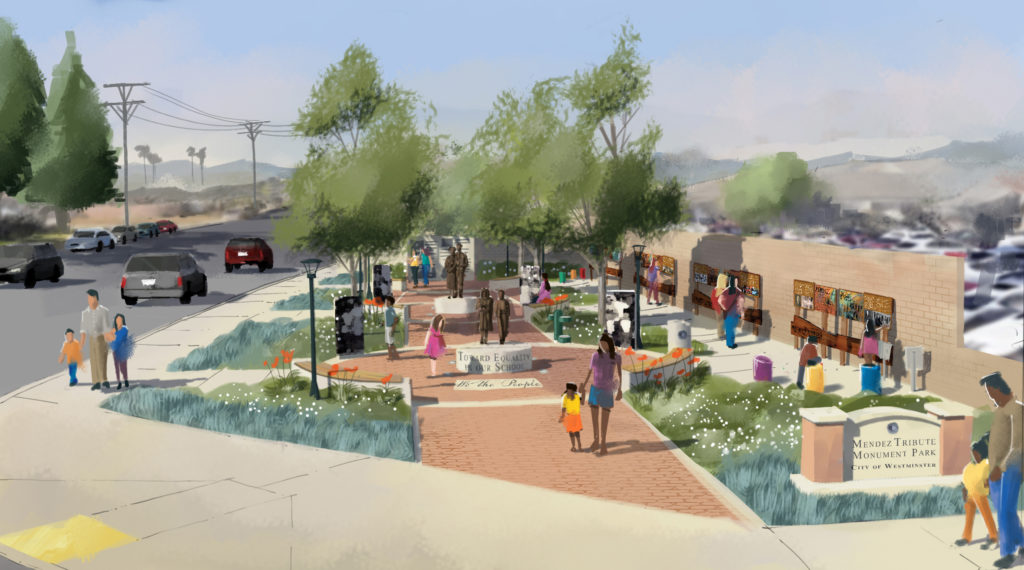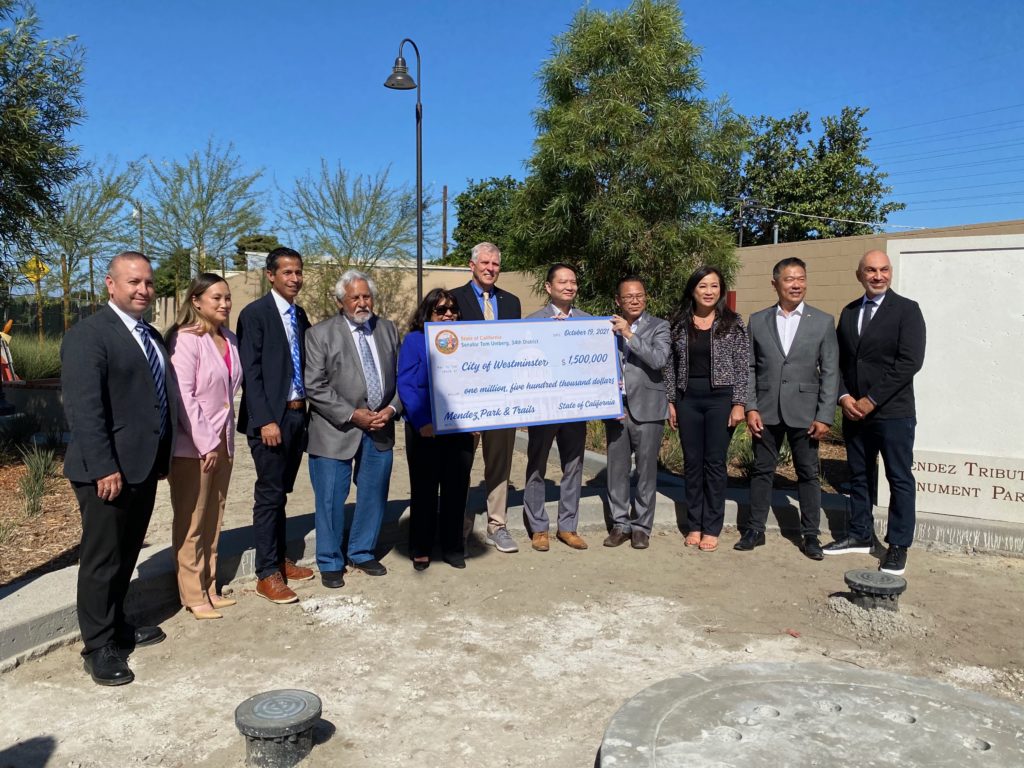
A rendering shows what the Mendez Tribute Monument Park will look like when it’s completed in the spring. Westminster city officials are also creating a Hoover Street walking trail with four interactive stations featuring the landmark case of Mendez v. Westminster. OCDE is developing content and curriculum for the installations.
It took years of collaboration from a diverse cast of role players to push through the landmark school desegregation case of Mendez v. Westminster. And the same could be said for the creation of a park and trail that will honor the historic case.
Concrete hardscaping and fresh signage now frame the emerging Mendez Tribute Monument Park at the intersection of Westminster Boulevard and Olive Street, and on Tuesday many of its key backers gathered there to celebrate another development — a check for $1.5 million in state funding, delivered by California State Senator Tom Umberg.

“I’m incredibly proud to support a project in my district as significant and important to California and the country,” Umberg said. “This funding will help generations of people for years to come learn about this important part of history.”
A brief ceremony was held to mark the occasion, with remarks from Westminster Mayor Tri Ta, City Council members and other dignitaries, including former Westminster City Councilman Sergio Contreras, who was credited with initiating the project in 2017. They were joined at the site by Gonzalo Mendez, Jr., who in the 1940s was denied the chance to enroll at the so-called “white school,” and his sister, Sandra Mendez Duran.
Transforming two public spaces
The Mendez Freedom Trail and Tribute Monument project is currently transforming two public spaces in Westminster.
The park along Westminster Boulevard, which is expected to open in the spring, will feature statues of two parents at the center of the civil rights case, Gonzalo and Felicitas Mendez, created by sculptor Ignacio Gomez. There will also be statues of students holding books to symbolize the 5,000 children represented in the lawsuit, along with a large textbook monument.
A short distance away, along Hoover Street, a walking trail will showcase four interactive stations with lessons on the case and its impacts. The path is expected to be completed by the fall. Meanwhile, the Orange County Department of Education has partnered with the City of Westminster to develop content and curriculum for all of the installations.
“Mendez v. Westminster was not just important for a city or a county, but our entire country,” Orange County Superintendent Dr. Al Mijares said. “We hope that our collaboration can unify others in the belief that every child deserves a quality education and that every person deserves dignity and respect.”
Pursuing justice in the courts
The case of Mendez v. Westminster dates back to 1943, when Gonzalo and Felicitas Mendez sought to enroll their children at Westminster’s 17th Street School, which was designated for white children. The Mendez family were Westminster residents and U.S. citizens, but they were turned away and told their children had to attend Hoover Elementary, known as the “Mexican school.”
Gonzalo and Felicitas Mendez decided to hire attorney David Marcus, and they teamed up with other Mexican-American families to pursue justice through the courts. In 1946, a federal judge ruled in their favor, and the decision was upheld by the U.S. Ninth Circuit Court of Appeals a year later.
The legal action helped pave the way for the U.S. Supreme Court to declare forced segregation unconstitutional in its famous Brown v. Board of Education decision of 1954. But local the case remained largely unknown until Sylvia Mendez, one of the Mendez children, began a campaign to raise awareness at her mother’s request.
In 2019, the story came full circle when the Westminster School District rededicated its central office with a marquee that now reads, “Westminster School District, In Honor of La Familia Mendez.” This year, Westminster High School in the Huntington Beach Union High School District also dedicated its new learning pavilion in honor of Sylvia Mendez, who was awarded the Presidential Medal of Freedom in 2011.
You can learn more about the case of Mendez v. Westminster by listening to this episode of The Deeper Learning Podcast, produced by OCDE.
